|
|
|
Sort Order |
|
|
|
Items / Page
|
|
|
|
|
|
|
| Srl | Item |
| 1 |
ID:
130868
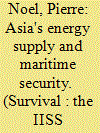

|
|
|
|
|
| Publication |
2014.
|
| Summary/Abstract |
Asia's reliance on international, seaborne energy trade is conducive to strategic cooperation. Whether this will outweigh strategic competition is far from certain. The Asia-Pacific accounts for a large and growing share of the world's energy-demand growth. With imports rising faster than consumption, the region is rapidly becoming the new centre of gravity for global energy markets. Such dynamics have made energy security a key policy concern for Asian states. The naval capacities of these countries are also growing swiftly, prompting some analysts to ask whether an arms race has begun. Although no one would suggest that this build-up of naval power is primarily driven by the need to secure energy supplies, the Chinese and Indian governments have identified energy and resource security as one rationale for developing naval power, particularly blue-water capabilities.
|
|
|
|
|
|
|
|
|
|
|
|
|
|
|
|
| 2 |
ID:
133275
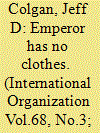

|
|
|
|
|
| Publication |
2014.
|
| Summary/Abstract |
Scholars have long debated the causal impact of international institutions such as the World Trade Organization or the International Monetary Fund. This study investigates Organization of Petroleum Exporting Countries (OPEC), an organization that purports to have significant influence over the market for the world's most important commodity-petroleum. Using four empirical tests, I find that OPEC has little or no impact on its members' production levels. These findings prompt the question of why so many people, including scholars, believe in OPEC's influence over the world's oil supply. The idea of OPEC as a cartel is a "rational myth" that supports the organization's true principal function, which is to generate political benefits for its members. One benefit it generates is international prestige. I test this idea using data on diplomatic representation and find that OPEC membership is associated with increased international recognition by other states. Overall, these findings help one to better understand international regimes and the process of ideational change in world politics.
|
|
|
|
|
|
|
|
|
|
|
|
|
|
|
|
| 3 |
ID:
133872
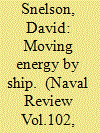

|
|
|
|
|
| Publication |
2014.
|
| Summary/Abstract |
The author, who retired from the RN in 2006 and who went to work in the ports industry and who is now a non-executive director of Milford Haven port, briefly outlines the changes that are occurring in the transport of energy supplies and the possible implications for the Royal Navy.
|
|
|
|
|
|
|
|
|
|
|
|
|
|
|
|
| 4 |
ID:
133774
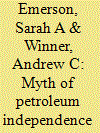

|
|
|
|
|
| Publication |
2014.
|
| Summary/Abstract |
U.S. politicians often work the topic of oil import independence into their campaign rhetoric as an ideal that would help separate U.S. economic prosperity and military responsibility from the volatility of Middle Eastern politics. In theory, oil independence would mean that events such as the Iranian revolution or internal political unrest in key Arab oil producers would have much less direct impact on the flow of oil to the United States, and thus U.S. prosperity (even if, in a global market for oil, the price impact of any supply disruption is shared by all consuming countries). More importantly, intra-state conflicts such as the Iraq-Iran war or the Iraqi invasion of Kuwait would not necessarily require large-scale U.S. military involvement to ensure oil production and exports to the United States and its allies. This linkage between U.S. oil import dependence and military commitment to the Gulf region has given rise to a myth favored by policymakers, markets, and the public that if the United States could attain oil independence, we could also reduce our military responsibilities around the world. Recent and ongoing changes in both the oil sector and in political-military strategy are for the first time in forty years combining in a manner that is leading some to believe this story could come true.
|
|
|
|
|
|
|
|
|
|
|
|
|
|
|
|
| 5 |
ID:
133582
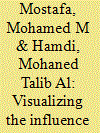

|
|
|
|
|
| Publication |
2014.
|
| Summary/Abstract |
The aim of this paper is to investigate why some internal conflicts are terminated quickly, while others linger for several decades without a looming resolution in the horizon. In an attempt to achieve this objective, the role played by geopolitical factors in the Arab world's internal conflicts was investigated. More specifically, we used Kohonen self-organizing maps, an artificial intelligence-based neural network technique, along with event duration models to investigate the role played by distance from the capital, access to international borders, terrain, valuable natural resources such as oil, and rebels fighting capability in civil wars in the Arab world. Using recently validated data spanning more than 50 years of Arab civil wars (1948-2003), our findings indicate that previously ignored geopolitical factors seem to play an important role in the duration of internal conflicts in the Arab World.
|
|
|
|
|
|
|
|
|
|
|
|
|
|
|
|
|
|
|
|
|